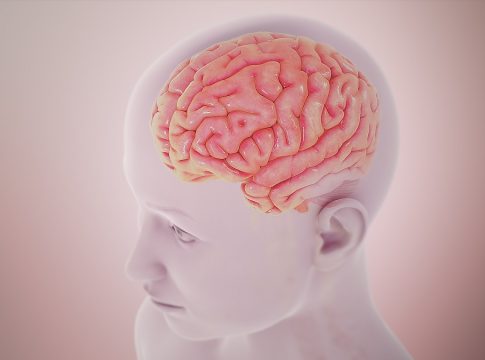Brain tumors are a complex medical issue with a variety of potential contributing factors. While the exact cause of many brain tumors remains unknown, significant research has shed light on the potential influences of genetics, environmental exposures, and even past medical treatments. This blog post will delve deeper into the current understanding of what causes brain tumors.
Understanding Brain Tumors: Growth and Types
Simply put, a brain tumor is an abnormal mass of cells that grow uncontrollably within the brain. These cells lose the normal regulatory mechanisms that govern cell division and growth, leading to the formation of a tumor. Brain tumors can occur in any part of the brain, with the three primary regions being the cerebrum (responsible for thought, sensation, and movement), the cerebellum (involved in coordination and balance), and the brainstem (controls vital functions like breathing and heart rate).
There are two main classifications of brain tumors: malignant and benign. Malignant tumors are cancerous, meaning they have the potential to spread to other parts of the brain or body. These tumors are typically fast-growing and pose a significant health risk. Benign tumors, on the other hand, are not cancerous. They don’t spread and are generally slow-growing. However, even benign tumors can cause serious health problems depending on their location and size, as they can press on vital brain structures and disrupt normal function.
The Role of Genetics in Brain Tumor Development
Genetics plays a significant role in some brain tumor cases. Inherited mutations in certain genes can predispose individuals to developing brain tumors. Examples of such genetic conditions include:
- Retinoblastoma: This childhood cancer of the eye is sometimes linked to an increased risk of developing brain tumors in the pineal gland.
- Neurofibromatosis: This genetic disorder affects the nervous system and can cause the growth of tumors on the nerves and throughout the body, including the brain.
- Von Hippel-Lindau disease: This rare condition increases the risk of developing various types of tumors, including those in the brain, kidneys, and other organs.
However, it’s important to remember that having a genetic predisposition doesn’t guarantee developing a brain tumor. Many people with these conditions never develop brain tumors, and conversely, individuals with no family history can still develop them. This suggests that other factors, such as environmental exposures, may also play a part.
Environmental Exposures and Brain Tumor Risk
Research suggests that exposure to certain environmental factors may contribute to the development of brain tumors. Some potential environmental risk factors include:
- Chemical exposure: Certain chemicals used in industries like rubber manufacturing, oil refining, and plastics production have been linked to an increased risk of brain tumors. These chemicals can damage DNA and disrupt normal cell growth.
- Ionizing radiation: Exposure to high doses of ionizing radiation, such as from atomic bombs or certain medical procedures like radiation therapy for cancer in the head and neck region, can increase the risk of developing brain tumors later in life. However, it’s important to note that the risk associated with diagnostic X-rays or low-level radiation exposure is very low.
- Cell phone use: While the research is ongoing, there’s currently no conclusive evidence that cell phone use directly causes brain tumors.
Previous Medical Treatments and Brain Tumor Risk
In some cases, previous medical treatments can ironically increase the risk of developing brain tumors in the future. For example, radiation therapy used to treat cancer in the head and neck region can damage healthy brain tissue and raise the risk of developing a secondary brain tumor years later. However, the benefits of radiation therapy often outweigh the risks, especially when dealing with a life-threatening cancer.
Other Potential Risk Factors and Areas of Research
While genetics and environment are major areas of focus in brain tumor research, there are other potential risk factors being explored. These include:
- Head injuries: Although the link is not fully understood, some studies suggest a possible connection between serious head injuries and an increased risk of developing certain brain tumors later in life.
- Infections: Certain viral infections, such as the Epstein-Barr virus (EBV), have been associated with some types of brain tumors, but the exact nature of the link remains unclear.
- Immune system function: A weakened immune system may play a role in the development of some brain tumors. However, more research is needed to confirm this association.
Looking Forward: The Future of Brain Tumor Research
Research into brain tumors is ongoing and constantly evolving. With advancements in genetic sequencing, scientists are identifying new genes associated with brain tumor development. Additionally, environmental studies are aiming to pinpoint specific chemicals or exposures that contribute to the risk.
Furthermore, researchers are exploring the potential of using genetic testing to identify individuals at high risk of brain tumors. This could enable preventative measures or early detection strategies. Finally, the development of targeted therapies tailored to specific genetic mutations holds promise for personalized treatment approaches with improved effectiveness and fewer side effects.
By unraveling the complexities of brain tumor causes, researchers are paving the way for a future with more effective prevention, diagnosis, and treatment options for this devastating condition.
Conclusion: A Complex Puzzle
Understanding the causes of brain tumors is an ongoing pursuit in the medical field. While genetics and environmental factors likely play significant roles, the exact reasons why brain tumors develop remain complex and multifaceted. Continued research holds the promise of uncovering new information and paving the way for improved prevention strategies and more effective treatments for these challenging conditions.
